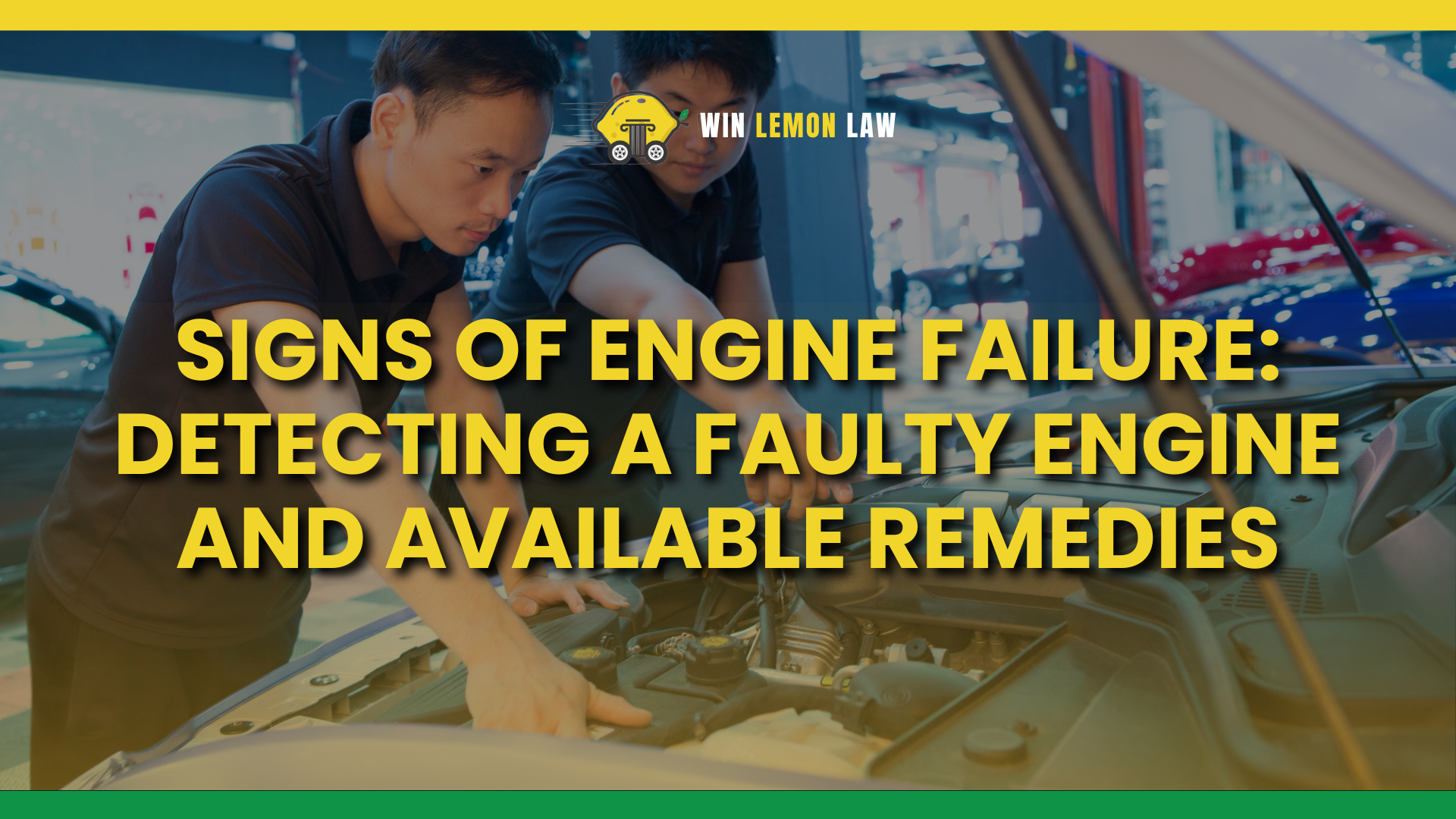In this article, we’ll examine the critical signs of engine failure, how to identify them early, and the remedies available to prevent costly repairs. Your car’s engine is the heart of its operation, and when it begins to fail, the effects can be both damaging and expensive. Spotting the signs of engine trouble early on can make the difference between a quick fix and a major repair bill. Whether it’s a strange noise, a performance issue, or a warning light on your dashboard, these early warning signs provide valuable clues to what might be going wrong under the hood. By learning to identify these symptoms quickly, you can take the necessary steps to address problems before they escalate into severe engine damage.
It’s not just about recognizing the symptoms; it’s also about understanding the urgency behind them. Ignoring the early signs of engine failure could lead to serious consequences, from engine breakdowns to complete vehicle failure, which can be both time-consuming and costly to fix. This guide will help you learn the most common signs of engine problems, what they mean, and how to prevent engine failure with proper maintenance. Taking action sooner rather than later is key to keeping your car running smoothly and avoiding major repairs. Let’s dive into the most important early indicators that your engine might be in trouble and what you can do about it.
Recognizing the Early Signs of Engine Failure

Spotting the early signs of engine failure is essential for maintaining your vehicle’s performance, ensuring its longevity, and avoiding costly repairs. Your engine is the heart of your vehicle, and when it begins to show signs of trouble, addressing these issues early can save you from more significant damage down the road. Ignoring the warning signs can result in expensive repairs or even the need for a full engine replacement, which could be a financial burden and a major inconvenience.
Paying attention to your car’s behavior is the first step in detecting engine problems. While a smooth-running engine might seem like a given, a vehicle in need of repair can begin to exhibit a variety of symptoms. Strange noises, such as knocking, grinding, or unusual vibrations, are among the most obvious indicators that something is wrong. These noises often signify issues with the engine’s internal components, such as worn-out bearings, misfiring cylinders, or insufficient lubrication. If you notice any odd sounds that weren’t present before, it’s important to investigate them sooner rather than later.
Unusual engine performance is another critical sign that your engine may be failing. For instance, rough idling or stalling, especially when the car is at a stop, can indicate that your engine is not operating smoothly. If your car struggles to start, idles unevenly, or suddenly loses power while driving, it’s a clear warning sign that something is off. In some cases, a sluggish or hesitant acceleration can indicate an issue with the fuel system, ignition system, or other vital engine components. These performance issues often result from problems that, when left unchecked, can lead to more severe engine damage and decreased vehicle reliability.
Dashboard warning lights are also key indicators that shouldn’t be ignored. Modern vehicles are equipped with sensors that detect potential engine problems, and these sensors trigger warning lights on the dashboard when something is wrong. If your check engine light comes on, it could be a sign of something as simple as a loose gas cap or as serious as an internal engine malfunction. However, a blinking check engine light is particularly alarming and usually indicates a more immediate issue, such as misfiring or faulty sensors, which requires prompt attention from a mechanic.
In addition to these common signs, other symptoms, such as engine overheating, smoke coming from the engine, or strange smells, can signal significant engine trouble. Overheating is particularly dangerous, as it can lead to severe damage if not addressed immediately. If you notice your temperature gauge climbing into the red zone, or if steam or smoke begins to pour from the engine, it’s critical to pull over and turn off your vehicle to prevent further harm.
Recognizing these early warning signs and acting on them promptly is crucial for avoiding major engine failure and expensive repairs. By staying vigilant and proactive, you can address minor issues before they escalate into more serious problems, helping to extend the lifespan of your engine and keep your vehicle running smoothly for years to come.
Common Symptoms: Rough Idling, Knocking Sounds, and Sluggish Acceleration

If your car is idling unevenly, making knocking sounds, or accelerating sluggishly, it may be a sign that the engine is not functioning at its best. Rough idling occurs when the engine struggles to run smoothly while the car is stationary. Knocking sounds may indicate that the engine’s bearings are worn out or that there’s a lack of sufficient oil pressure. Sluggish acceleration means the engine is not operating optimally, potentially due to internal damage.
A popping noise could also point to an issue with the ignition system, while a hissing sound often signals leaks in the cooling or vacuum systems. By staying alert to these early signs, you can address the issue before it escalates into more severe and expensive problems.
What Are the Warning Lights Trying to Tell You?
Your car’s dashboard warning lights serve as critical indicators of internal engine issues. Understanding what these lights mean can help you avoid more serious engine damage.
Most Important Dashboard Lights and What They Signal
One of the most important warning lights is the Check Engine light. A steady illumination means that it’s time to visit a mechanic, while a blinking light indicates a more urgent issue that needs immediate attention. Oil leaks may show up as spots on your driveway or a drop in the oil level, signaling potential internal engine damage. Overheating is another major concern, which could be indicated by a high-temperature gauge or steam coming from under the hood. Similarly, a sweet smell in your vehicle suggests a coolant leak, which could cause significant damage over time.
Understanding these warning lights helps you take proactive measures before they lead to complete engine failure.
How to Prevent Engine Failure with Proper Maintenance
Routine maintenance is vital to keep your engine in good working condition and avoid unexpected failures. Regular oil changes, fluid checks, and filter replacements play a crucial role in maintaining engine health.
Regular Oil Changes, Fluid Checks, and Filter Replacements
To ensure that your car’s engine remains in optimal condition, it’s essential to stay on top of regular oil changes and fluid checks. Neglecting these tasks can result in poor performance, reduced fuel efficiency, and internal engine damage. For vehicles expected to reach high mileages, it’s especially important to follow the recommended maintenance schedule to prevent engine issues and prolong your car’s lifespan.
Changing the oil on time ensures that the engine remains lubricated, while replacing air filters keeps contaminants out. These simple tasks can prevent serious damage and improve the overall performance of your vehicle.
When Should You Take Your Car to a Mechanic?

If your car continues to show warning lights, makes strange noises, or experiences performance issues, it’s time to take it to a professional for a check-up. Proactive maintenance can help identify problems early, ensuring that your car runs smoothly for years to come.
Indicators That It’s Time to Seek Professional Help
Persistent engine stalling or difficulty accelerating are clear signs that something is wrong. These issues could point to internal engine damage, power loss, or a failing catalytic converter. Vibrations or misfires can also indicate engine problems that require immediate professional attention.
Closing
When it comes to your vehicle, recognizing the early signs of engine failure and addressing them promptly can save you from significant headaches and expensive repairs. At Win Lemon Law, we understand how stressful it can be to deal with a malfunctioning engine, especially if the issues stem from a defective vehicle. If you’re experiencing symptoms of engine failure, such as unusual noises, reduced performance, or persistent warning lights, don’t wait until the problem worsens. It’s important to act quickly and seek professional assistance to prevent further damage.
If you’re facing ongoing engine problems, it might be time to consider your legal options. In California, the Lemon Law offers protection to consumers with vehicles that consistently fail to meet quality and performance standards. If your car qualifies as a lemon, you could be entitled to a replacement vehicle or a refund, saving you from the frustration of dealing with a defective car.
Our experienced team at Win Lemon Law is here to guide you through the legal process and help you secure the compensation you deserve. We specialize in lemon law claims and can provide the expertise you need to navigate the complexities of California’s Lemon Law, ensuring that your rights are protected. Don’t let engine issues or faulty vehicles continue to disrupt your life—reach out to our team of experts at Win Lemon Law today, and let us help you get the resolution you deserve.

